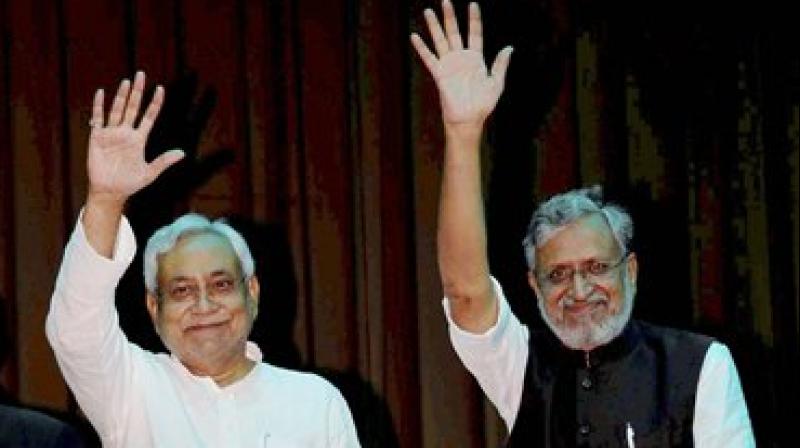Political Gup-Shup: JD(U) chief's ghar wapsi, courtesy Modi-Shah
Nitish Kumar's ghar wapsi to the BJP was painstakingly planned by Prime Minister Narendra Modi and Amit Shah.

While the media in Bihar had been predicting that Janata Dal (United) president Nitish Kumar was set to part company with the Rashtriya Janata Dal any day, his colleague in Delhi, Sharad Yadav, was apparently taken aback when the Grand Alliance collapsed last week. It is well known that he does not have a cordial relationship with Mr Kumar, which probably explains why Mr Yadav was kept in the dark about his decision to resign and tie-up with the BJP again. On the other hand, Mr Kumar is learnt to have assured Mr Yadav that the alliance was intact. Mr Yadav, in fact, conveyed as much to a senior Congress leader on the day Mr Kumar had met Congress vice-president Rahul Gandhi when he came to Delhi for former President Pranab Mukherjee’s farewell. Mr Yadav told the Congress leader that he had a chat with Mr Kumar after his meeting with Mr Gandhi, and the chief minister, though crestfallen, had told him that the ongoing impasse would be resolved soon.
JD(U) president Nitish Kumar’s ghar wapsi to the BJP was painstakingly planned by Prime Minister Narendra Modi and Amit Shah. The strategy was obvious: discredit RJD chief Lalu Prasad Yadav and his family so that it becomes impossible for Mr Kumar to continue his partnership with the RJD. Bihar BJP leader Sushil Modi was initially not involved in this exercise as the Modi-Shah duo were not sure about his loyalties because of his old association with L.K. Advani. In fact, it was for this reason that he was denied a Rajya Sabha seat. It was finance minister Arun Jaitley who managed to persuade the PM and the BJP president that Sushil be entrusted with the task of running the campaign against the RJD chief as he had the necessary skills. Although they were initially reluctant, the BJP bosses are pleased with the campaign run by Sushil. As a reward, Sushil got his old job back as deputy CM of Bihar.
Media persons covering the external affairs ministry are normally informed in advance about briefings. The routine message, sent to all on the mailing list, usually says: All media cordially invited, which meant that journalists holding a PIB card could attend. But of late, there is change. The message now reads: The recipients of this message are invited. This may have gone unnoticed except for the fact that the security personnel at Jawaharlal Nehru Bhavan, the ministry’s official headquarters, have been checking the mobile phones of mediapersons to see if they had received the invitation. The move to limit entry to official briefings is being seen as yet another example of the efforts being made to deny access to mediapersons. Although he is the minister of information technology, Ravi Shankar Prasad realised the power of social media onlyrecently. When his daughter got married to an Iyer, the minister tweeted about it. Mr Prasad was amazed by the response. He was inundated with thousands of congratulatory messages from Tamil Nadu.
While one tweet remarked that the people of Tamil Nadu were happy to welcome his daughter as their daughter-in-law, another one congratulated him for following in the footsteps of Mahatma Gandhi and C. Rajagopalachari, who are the grandparents of Gopal Gandhi, the Opposition’s vice-presidential candidate. In an unusual move, the Congress expressed its unhappiness over President Ram Nath Kovind’s inaugural speech as it failed to mention Jawaharlal Nehru. The party reacted strongly at its official media briefing. While the Congress was quick to complain about Mr Kovind, it was constrained from doing so about former President Pranab Mukherjee whose farewell speech did not refer to Congress president Sonia Gandhi. Though he did make amends by referring to her while delivering his speech, the Congress is furious. What enraged the party further is that Mr Mukherjee devoted a full para to praising Prime Minister Narendra Modi. The Congress is seething but is unable to say anything.

